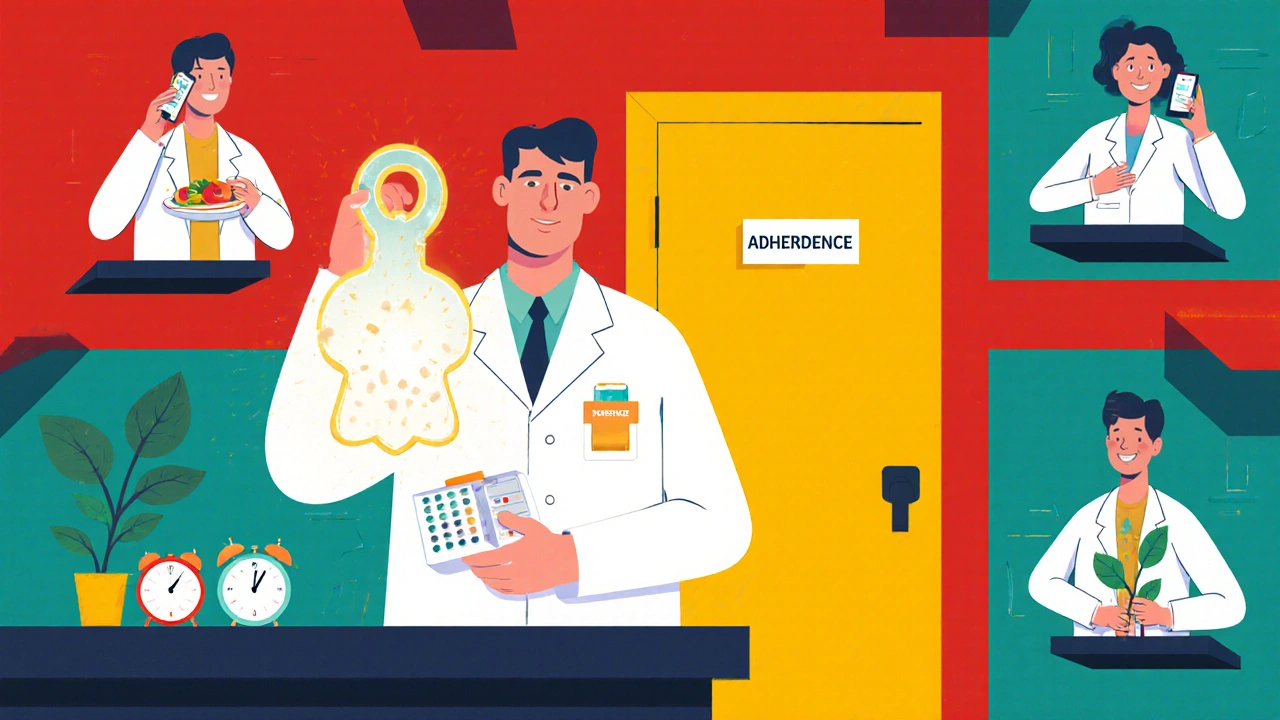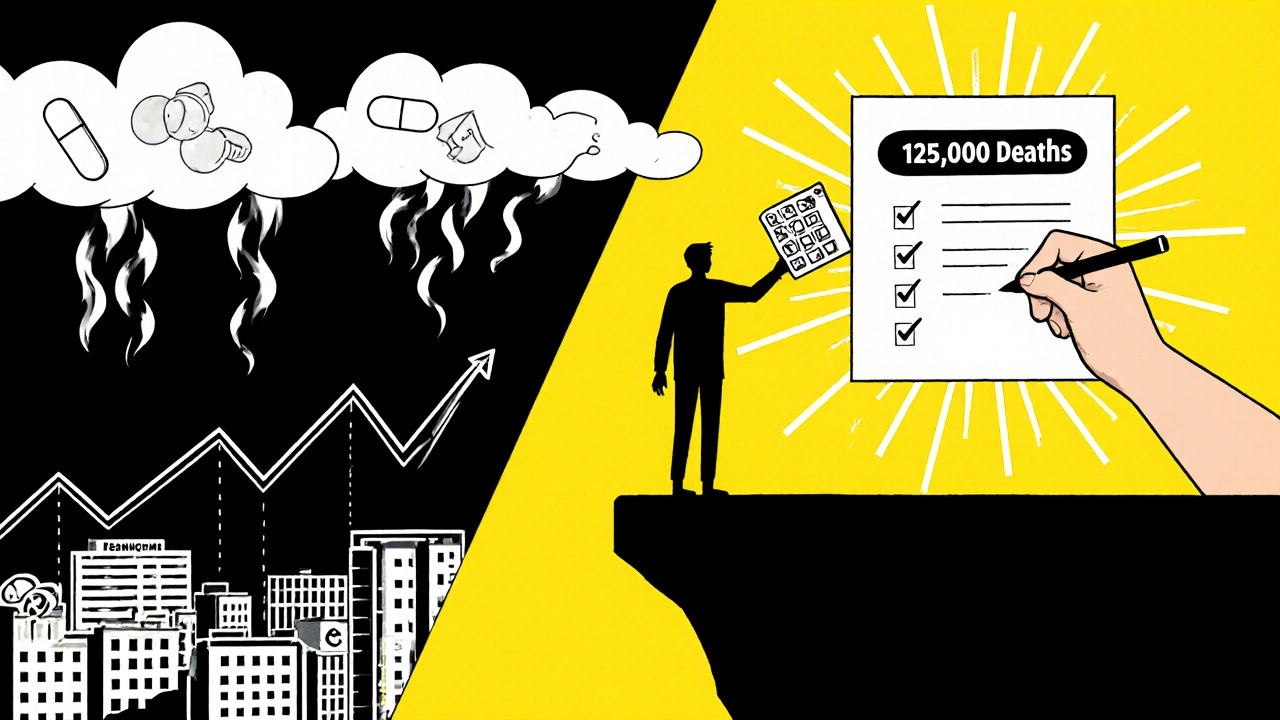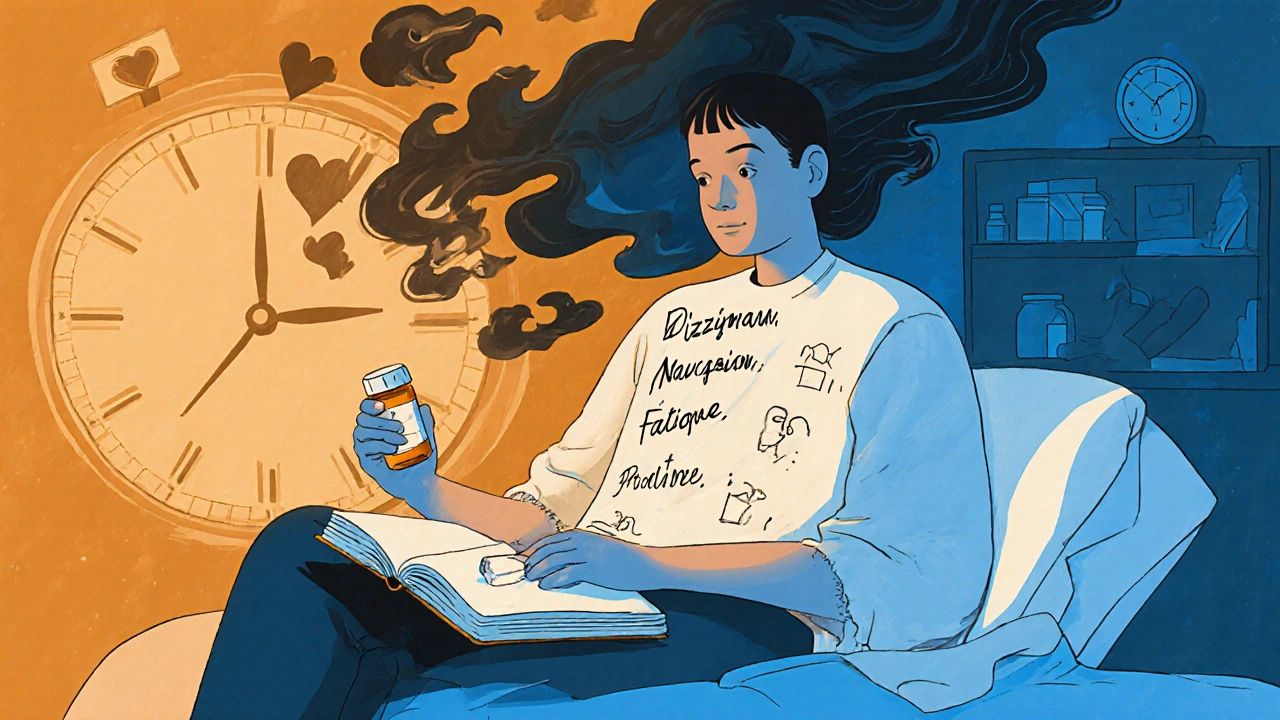You’ve been prescribed a medication. You know it’s important. But then the side effects start - the dizziness, the nausea, the fatigue, the weird taste in your mouth. Suddenly, skipping a dose feels like a small victory. You tell yourself you’ll get back on track tomorrow. But tomorrow never comes. And now, weeks later, your condition isn’t improving. You’re not alone. About 50% of people taking chronic medications don’t take them as prescribed. And side effects are one of the biggest reasons why.
Why Side Effects Make You Skip Doses
It’s not laziness. It’s not ignorance. It’s fear. When a medication causes unpleasant or scary side effects, your brain starts to associate the pill with discomfort. That’s natural. Your body is signaling: This isn’t safe. Even if you understand the long-term benefits, your short-term experience wins.Studies show that people with depression are twice as likely to skip their meds because of side effects. The same pattern shows up with blood pressure pills, diabetes drugs, and cholesterol-lowering statins. One study found that after the first refill, up to 30% of patients stop taking their meds entirely because side effects became too much to handle.
And here’s the cruel twist: side effects often start small. A little drowsiness. A dry mouth. You think, It’ll pass. But it doesn’t. Or worse - it gets worse. And by the time you talk to your doctor, you’ve already missed weeks of treatment. That’s when real damage starts: higher blood pressure, rising blood sugar, more hospital visits.
The Real Cost of Skipping Pills
Skipping your meds doesn’t just mean your condition won’t improve. It means you’re putting your life at risk.In the U.S. alone, medication nonadherence leads to about 125,000 preventable deaths every year. That’s more than traffic accidents. It’s also responsible for up to 69% of medication-related hospitalizations. And the financial toll? Up to $44,000 per person annually in extra healthcare costs.
For chronic conditions like heart disease or diabetes, you need to take your meds at least 80% of the time for them to work. If you’re skipping doses because of side effects, you’re not just feeling worse - you’re making your disease worse. And the cycle keeps going: worse symptoms → more meds → more side effects → more skipping.
What No One Tells You About Side Effects
Most patients think side effects are either normal or unavoidable. They’re not. Many side effects are manageable - if you speak up early.Doctors don’t always ask about side effects. Nurses forget to document them. Pharmacists are least likely to record nonadherence, even though they see you most often. That means your struggle with side effects might be slipping through the cracks.
But here’s the truth: side effects aren’t a one-size-fits-all problem. Two people on the same drug can have completely different experiences. One gets headaches. Another gets insomnia. A third feels nothing. Your body reacts differently. That’s why blanket advice like “just push through it” doesn’t work.
Some side effects fade after a few weeks. Others don’t. And some can be reduced or eliminated by changing the dose, timing, or even the brand. But you won’t know unless you talk to someone who can help you adjust - not just endure.

What Actually Works to Stay on Track
The good news? There are proven ways to beat side effect-driven nonadherence. And they don’t require willpower.1. Talk to your pharmacist first. Pharmacists are medication experts. They see hundreds of patients every week. They know which side effects are common, which are dangerous, and how to fix them. One study showed that pharmacist-led interventions increased adherence by up to 40%. They can help you switch to a different formulation - like a liquid instead of a pill - or suggest taking your med with food to reduce nausea.
2. Track your side effects. Keep a simple log: date, time, medication, side effect, how bad it was (1-10), and what you did. Did you eat? Did you drink water? Did you take it at night instead of morning? Bring this to your next appointment. It’s not just a list - it’s evidence. And evidence leads to change.
3. Ask about alternatives. There are often multiple drugs for the same condition. If one makes you feel awful, another might not. For example, some blood pressure meds cause a dry cough. Others don’t. Statins can cause muscle pain - but switching to a different statin or lowering the dose often fixes it. Don’t assume you’re stuck.
4. Use a pill organizer with alarms. If you’re forgetting doses because you’re tired or overwhelmed, a simple weekly pill box with a timer can help. Many pharmacies offer them for free. Some apps even send reminders and let you log side effects right from your phone.
5. Ask about timing. Taking a med at night instead of morning can stop dizziness during the day. Taking it with a snack can reduce stomach upset. Small changes like this can make a huge difference.
When to Call Your Doctor - and When to Wait
Not every side effect needs an emergency visit. But some do.Call your doctor right away if you have:
- Swelling in your face, lips, or throat
- Difficulty breathing
- Severe rash or blisters
- Unexplained bruising or bleeding
- Thoughts of self-harm or extreme mood changes
Wait and track if you have:
- Mild nausea or upset stomach
- Headaches that come and go
- Fatigue that improves after a few days
- Dry mouth or constipation
Give it two weeks. If it doesn’t improve, bring your log to your doctor. Don’t wait until you’re miserable.
How Your Pharmacist Can Be Your Secret Weapon
Most people think pharmacists just hand out pills. They’re wrong. Pharmacists are trained to spot adherence problems before they become crises. They can:- Check for drug interactions you didn’t know about
- Recommend cheaper generics that work just as well
- Help you get free samples if side effects are too severe
- Set up automatic refills so you don’t run out
- Coordinate with your doctor to adjust your plan
One program in Australia saw a 35% rise in adherence within 90 days just by having pharmacists call patients who missed refills and ask, “What’s been making it hard to take your meds?” That’s it. Just asking opened the door to solutions.

What You Can Do Today
You don’t need to fix everything at once. Start with one step:- Look at your medicine cabinet. Pick one medication you’ve been skipping.
- Write down the side effect that’s stopping you.
- Call your pharmacy. Ask: “Is there a way to make this easier to take?”
- Set a daily phone alarm for when you take it.
- Next time you see your doctor, bring your notes.
That’s it. No grand plan. No guilt. Just one small, smart move.
It’s Not About Willpower - It’s About Design
The system isn’t designed to help you stay on track. Prescriptions are written fast. Side effects are ignored. Follow-ups are rare. But you don’t have to accept that.Medication adherence isn’t about being perfect. It’s about being supported. It’s about having someone who listens when you say, “This isn’t working.” And it’s about knowing you have options - even when the side effects feel overwhelming.
You’re not failing your treatment. The treatment might be failing you. And that’s something you can change.
Why do people stop taking their medications even when they know it’s important?
People often stop because of side effects - nausea, dizziness, fatigue, or even just the fear of long-term risks. Even if they understand the benefits, the daily discomfort makes skipping feel like the easier choice. Studies show side effects are the top reason for stopping chronic meds, not forgetting or cost.
Can side effects go away over time?
Some do, especially mild ones like nausea or drowsiness, which often improve after the first 2-4 weeks as your body adjusts. But others don’t. If a side effect is still bothering you after a month, it’s not normal - it’s a sign you need to talk to your doctor or pharmacist about alternatives.
Is it safe to stop a medication if I’m having side effects?
Never stop a medication without talking to your healthcare provider first. Stopping suddenly can cause dangerous rebound effects - like spikes in blood pressure or seizures. But you can safely switch to another drug or adjust the dose with professional help.
How can I tell if my side effects are serious?
Call your doctor immediately if you have swelling, trouble breathing, chest pain, severe rash, unexplained bruising, or thoughts of self-harm. For milder issues like upset stomach or tiredness, track them for two weeks. If they don’t improve, it’s time to ask for help.
Why should I talk to my pharmacist instead of my doctor?
Pharmacists specialize in medications - not just prescribing them, but how they affect your body. They know which side effects are common, which drugs interact, and how to adjust timing or form (like switching from a pill to a liquid). They’re often more accessible and can make changes faster than waiting for a doctor’s appointment.
Can I switch to a cheaper version of my medication?
Yes - many brand-name drugs have generic versions that work the same way but cost much less. Pharmacists can check if a generic is available and if it’s right for you. Sometimes, even switching brands within the same drug class reduces side effects.
What if I can’t afford my meds?
Pharmacies often have free sample programs, patient assistance plans, or discount cards. Some manufacturers offer coupons. Pharmacists can help you find these options - you don’t have to choose between your health and your budget.
How do I know if I’m really taking my meds as prescribed?
Count your pills. If you have more than 10% left at the end of a month, you’re probably skipping. Use a pill organizer with compartments. Set phone alarms. Track doses in a notebook or app. These simple tools give you real data - not guesswork.
Are there apps that help with medication adherence?
Yes. Apps like Medisafe, MyTherapy, and even Apple Health can send reminders, track side effects, and share reports with your pharmacist. Some even sync with smart pill bottles that log when you open them. These tools don’t replace human help - but they make it easier to get it.
What’s the best way to talk to my doctor about side effects?
Be specific. Don’t say, “I feel bad.” Say, “After taking this pill at 8 a.m., I get dizzy for three hours and can’t drive. I’ve missed work twice this month.” Bring a written log. Ask: “Is there another option that doesn’t cause this?” Most doctors want to help - they just need clear information to act on.
Final Thought: You’re Not Broken
You’re not lazy. You’re not failing. You’re a person trying to manage a complex, often poorly designed system. Medications are powerful - but they’re not magic. They need support, adjustment, and someone who listens.The goal isn’t perfection. It’s progress. One pill taken. One side effect documented. One conversation started. That’s how you stay on track - not by fighting yourself, but by changing the system around you.




11 Comments
Kaylee Crosby-26 November 2025
Been there. Took my blood pressure med for 3 weeks, felt like a zombie, almost quit. Called my pharmacist - they switched me to a different class. No more dizziness, same results. Seriously, pharmacists are the real MVPs. Don’t suffer in silence - ask for help. You’re not weak for needing it.
Karen Ryan-26 November 2025
This is so needed 💗 I used to skip my diabetes meds because of the nausea… then I started taking them with a banana and a sip of ginger tea. Game. Changer. 🍌🍵 You don’t have to power through - just tweak it.
Adesokan Ayodeji-27 November 2025
Man, I love how this post breaks it down without guilt-tripping anyone. I’m from Nigeria, and here, a lot of folks stop meds because they think side effects mean the drug is ‘poison’ - not that it’s just not right for their body. I’ve seen cousins quit statins because they got a headache, then ended up in the hospital six months later. The truth? Your body isn’t broken, the match between you and the drug just isn’t right. Talk to your pharmacist - they’ve seen 50 versions of your story this week. And yeah, tracking side effects? Do it on your phone notes. No fancy journal needed. Just write: ‘Day 4: dizzy after 10am pill. Ate toast. Still dizzy.’ That’s all. That’s enough. Small steps. No perfection. Just progress. And if you’re feeling like a failure for skipping? Stop. You’re not. You’re human. This system is broken, not you.
Terry Bell-28 November 2025
It’s funny how we treat meds like they’re supposed to be effortless. Like if you’re struggling, you’re weak. But think about it - we don’t expect someone to run a marathon with a broken ankle and call them lazy. Why do we do it with pills? Your body’s not a machine. It’s a messy, adaptive, emotional system. Sometimes the pill’s fine, but your circadian rhythm hates it. Sometimes the brand’s fine, but your stomach’s been through hell and just says ‘nope.’ The real win isn’t taking 100% of your pills - it’s having the courage to say ‘this isn’t working’ and then actually doing something about it. That’s not failure. That’s wisdom. And yeah, pharmacists? They’re the unsung heroes. They don’t get medals. But they save lives. Every. Single. Day.
Lawrence Zawahri-28 November 2025
THEY WANT YOU DEPENDENT. They don’t care if you feel like crap. Big Pharma knows if you quit, they lose money. But if you stay on the same pill, even with side effects, you keep buying. They don’t want you switching to a cheaper generic - they want you hooked. That’s why your doctor never asks about side effects - they’re paid by the drug companies. Look up the PhRMA lobbying records. 100 MILLION DOLLARS A YEAR. That’s not healthcare. That’s a racket. And they’re laughing all the way to the bank while you’re puking in the bathroom after your 8am pill. Wake up. You’re being played.
Benjamin Gundermann-30 November 2025
Look, I get it. You wanna feel good. But you know what? America’s got it soft. Back in my day, you took your medicine like a man. No apps. No pill organizers. Just grit. Now everyone’s out here tracking their nausea like it’s a TikTok trend. I mean, come on. If you can’t handle a little dizziness, maybe you shouldn’t be on meds at all. Just sayin’. Also, pharmacists? Please. They’re just cashiers with white coats. Let the doctor handle it. And why are we even talking about generics? Brand name works better. Always. It’s science. Or at least, it feels like it. And if you’re skipping doses because you’re tired? Maybe you just need to sleep less and live more. That’s what I always say.
Rachelle Baxter- 1 December 2025
Okay, but if you’re skipping meds because of side effects, you’re literally choosing death. I’m not being dramatic. This isn’t a ‘feelings’ issue. It’s a biological imperative. You have a condition. The drug works. The side effects are temporary. You’re not ‘victimized’ by your body - you’re being irresponsible. And using apps? Cute. But real adults take their pills without reminders. You don’t need a phone to tell you to breathe - you just do it. Why can’t you do this? It’s not hard. It’s not complicated. It’s just… discipline. And if you’re too lazy to have discipline, don’t blame the system. Blame yourself. And yes, I’m judging you. Because I care.
Dirk Bradley- 2 December 2025
It is, indeed, a matter of profound sociomedical significance that the contemporary healthcare paradigm has, in many instances, abdicated its responsibility to cultivate patient autonomy through rigorous, evidence-based dialogue. The commodification of pharmaceuticals has engendered a culture of passive compliance, wherein individuals are encouraged to regard side effects as inevitable rather than as data points requiring clinical intervention. The pharmacist, as a licensed arbiter of pharmacokinetic nuance, remains underutilized - a tragic misallocation of human capital. One must, therefore, advocate for the institutional recentering of the pharmacist as a primary point of contact in chronic disease management. The data are unequivocal. The moral imperative, indisputable.
Emma Hanna- 3 December 2025
Ugh. I just saw someone say ‘just take it with food’ like that’s some magic fix. It’s not. It’s not always possible. I have gastroparesis. I can’t eat ‘with food.’ I have to take meds on an empty stomach. And now I’m dizzy all day. So what? Just ‘track it’? Like that helps? I’ve been tracking for two years. No one listens. No one cares. You people make it sound so easy. Like it’s just a checklist. It’s not. It’s a daily war. And you’re not here to help. You’re here to feel better about yourself. Thanks for nothing.
Manish Pandya- 4 December 2025
I’m from India, and here, many people stop meds because they think ‘it’s not working’ after a few days. But I’ve seen people take statins for 6 months before they even notice the difference. Side effects? Yeah, I got a headache for a week. But I kept going. Now my cholesterol is normal. I didn’t quit because I knew it was a process. Not everyone gets it right on the first try. But if you give it time, and talk to your doctor, most things can be fixed. Don’t give up after two weeks. Give it 2 months. And if it’s still bad? Then change it. But don’t quit without trying.
Kaylee Crosby- 6 December 2025
Emma, I hear you. That daily war? I’ve fought it too. I’ve been on three different meds for my depression - each one made me feel like I was drowning. I didn’t quit because I was weak. I kept going because I had a pharmacist who said, ‘Let’s try one more.’ And we did. And now I’m stable. It’s not about being perfect. It’s about not being alone in the fight. You’re not broken. You’re just in a system that forgets to ask, ‘How are you really doing?’ I’m here. I see you. And you’re not alone.